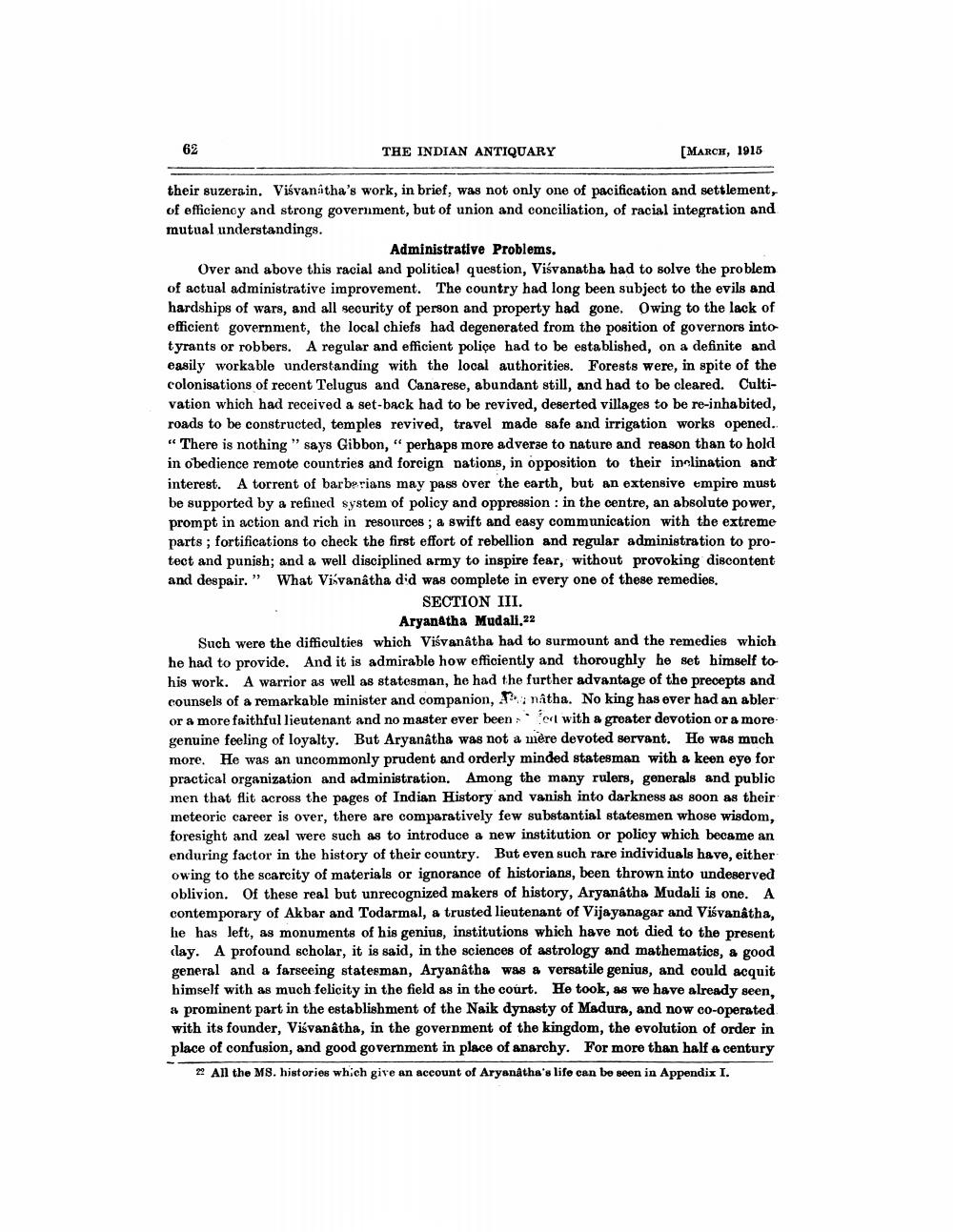________________
62
THE INDIAN ANTIQUARY
[MARCH, 1915
their suzerain. Visvanatha's work, in brief, was not only one of pacification and settlement, of efficiency and strong government, but of union and conciliation, of racial integration and mutual understandings.
Administrative Problems, Over and above this racial and political question, Visvanatha had to solve the problem of actual administrative improvement. The country had long been subject to the evils and hardships of wars, and all security of person and property had gone, Owing to the lack of efficient government, the local chiefs had degenerated from the position of governors into tyrants or robbers. A regular and efficient police had to be established, on a definite and easily workable understanding with the local authorities. Forests were, in spite of the colonisations of recent Telugus and Canarese, abundant still, and had to be cleared. Cultivation which had received a set-back had to be revived, deserted villages to be re-inhabited, roads to be constructed, temples revived, travel made safe and irrigation works opened. “There is nothing" says Gibbon, " perhaps more adverse to nature and reason than to hold in obedience remote countries and foreign nations, in opposition to their in lination and interest. A torrent of barberians may pass over the earth, but an extensive empire must be supported by a refined system of policy and oppression : in the centre, an absolute power, prompt in action and rich in resources; a swift and easy communication with the extreme parts ; fortifications to check the first effort of rebellion and regular administration to protect and punish; and a well disciplined army to inspire fear, without provoking discontent and despair." What Visvanatha did was complete in every one of these remedies.
SECTION III.
AryanAtha Mudali.22 Such were the difficulties which Visvanatha had to surmount and the remedies which he had to provide. And it is admirable how efficiently and thoroughly he set himself to his work. A warrior as well as statesman, he had the further advantage of the precepts and counsels of a remarkable minister and companion, natha. No king has ever had an abler or a more faithful lieutenant and no master ever been or with a greater devotion or a more genuine feeling of loyalty. But Aryanatha was not a mère devoted servant. He was much more. He was an uncommonly prudent and orderly minded statesman with a keen eye for practical organization and administration. Among the many rulers, generals and public men that fit across the pages of Indian History and vanish into darkness as soon as their meteoric career is over, there are comparatively few substantial statesmen whose wisdom, foresight and zeal were such as to introduce a new institution or policy which became an enduring factor in the history of their country. But even such rare individuals have, either owing to the scarcity of materials or ignorance of historians, been thrown into undeserved oblivion. Of these real but unrecognized makers of history, Aryanatha Mudali is one. A contemporary of Akbar and Todarmal, a trusted lieutenant of Vijayanagar and Visvanatha, he has left, as monuments of his genius, institutions which have not died to the present day. A profound scholar, it is said, in the sciences of astrology and mathematics, a good general and a farseeing statesman, Aryanatha was a versatile genius, and could acquit himself with as much felicity in the field as in the court. He took, as we have already seen. a prominent part in the establishment of the Naik dynasty of Madura, and now co-operated with its founder, Visvanatha, in the government of the kingdom, the evolution of order in place of confusion, and good government in place of anarchy. For more than half a century
22 All the MS. histories which give an account of Aryanatha's life can be seen in Appendix I.




